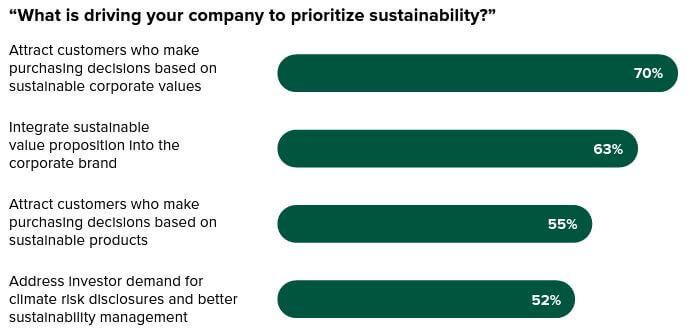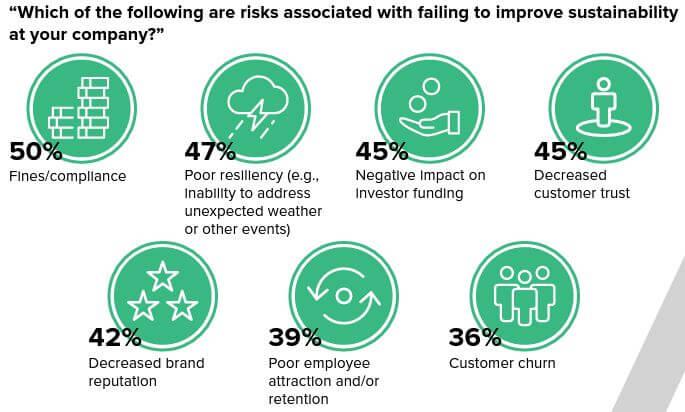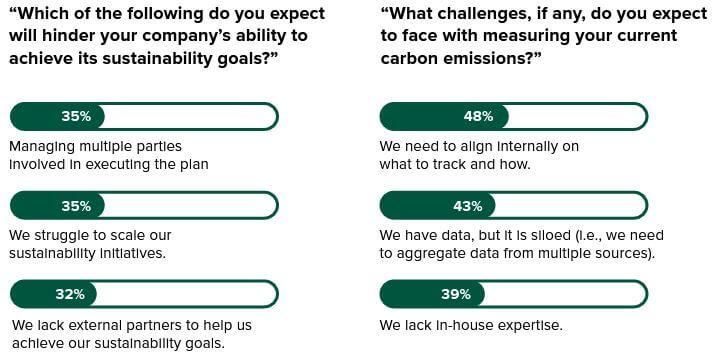
Study: Sustainability investment gives firms competitive advantage
share on
Companies that invest in sustainability will win stakeholder trust and gain a competitive advantage. According to a recent global study by Forrester Consulting commissioned and developed in collaboration with Johnson Controls, sustainability maturity is the most important business priority. In fact, 80% of the 2,348 business leaders surveyed globally said implementing or maturing their organisations' sustainability initiatives is their top business priority in the next 12 months. It is also the priority that has increased the most in importance during the past two years. The report also surveyed 246 business leaders in Singapore, Malaysia, Indonesia and Thailand.
Attracting customers who make purchasing decisions based on sustainable corporate values (70%) is the main driver for companies to prioritise sustainability. This was followed by integrating sustainable value proposition into the corporate brand (63%).


That said, the report found that failing to improve sustainability has a negative impact on investor funding (45%), customer trust (45%), brand reputation (42%), and employee recruitment and/or retention (39%).

While it is heartening to see sustainability being on the radar of companies, the report found that organisations are setting unrealistic goals. For example, 72% of respondents said implementing or maturing their organisation's sustainability programme is a goal that has grown in importance over the past two years. Also, 48% said their company has a long-term goal of reducing energy consumption across its portfolio of buildings by at least 50%, and 36% said their organisation has the same goal for reducing emissions enterprise-wide.
While these goals are commendable, the report said the average target date for achieving these goals is 2024. This poses a time crunch for companies given that most of them lack reporting software and would face additional challenges in scaling their efforts. Only 26% said their organisations use ESG reporting software today and although 43% of respondents reported that their organisations have the data they need, they still face challenges because the data is siloed.
Aside from reporting, there is also a shortage of sustainability talent. Slightly over a third of respondents (39%) said a lack of internal expertise prevents them from measuring their organisation's carbon footprint, and 32% said they lack external partners to help their organisations achieve their sustainability goals. Another challenge companies face is managing the different parties involved in plan execution and figuring out how to scale their organisation's initiatives.

Mei Peng Hor, business development director, sustainable infrastructure, Asia Pacific, Johnson Controls said in the race to decarbonisation, companies must align priorities to the demands of many stakeholders, work with partners to develop transparent sustainability roadmaps, and identify metrics and adopt tools to track progress.
"More customers are looking for ways to make this process easier, and are transferring their sustainability commitments and the risk to reach these targets to an external partner that has the capability, scale and ecosystem," Hor said.
Separately, on the topic of sustainability talent, LinkedIn's Global Green Skills Report revealed in April that the role of sustainability manager has seen the fastest growth in Singapore (41%), more so than the APAC average (28.6%). In fact, it was also listed in LinkedIn's Jobs on the Rise 2022 report as the top emerging job in the market. Also, while the sharing of green hiring was 15% higher in 2021 compared to 2016, non-green jobs also accounted for a growing share of hiring over the same period, eventually making up close to half (49.2%) of total hires.
Sustainability is also on the minds of agencies. Just yesterday, major agency networks along with Unilever, Google, Media, and European media company Sky intend to extend the Ad Net Zero programme from the UK to other major ad markets. The Ad Net Zero programme was launched in the UK in November 2020 by the Advertising Association, ISBA and the IPA and counts over 100 advertisers, agencies, commercial media owners and production companies in its membership. All the partners in the global coalition are supporters in the UK and are committed to build plans to extend Ad Net Zero into other major markets. The focus of the new Ad Net Zero group will be to rapidly establish plans for roll-out in major advertising markets with immediate focus on the US and the EU, working in partnership with the UK team.
Photo courtesy: Shutterstock
Related articles:
Study: A whopping 86% of consumers now value travel sustainability
Study: Consumers just aren't buying your sustainability claims
Spilling the tea: 4 ways Nestle communicates sustainability through its content
Mixed progress in SG green transformation, sustainability manager role on the rise
Study: Singapore's SMEs need a lot more help in creating sustainable practices
share on
Free newsletter
Get the daily lowdown on Asia's top marketing stories.
We break down the big and messy topics of the day so you're updated on the most important developments in Asia's marketing development – for free.
subscribe now open in new window
